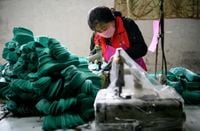As tensions between the United States and China escalate, a new front in the trade war has emerged—TikTok. Chinese factories are harnessing the power of social media to directly appeal to American consumers, attempting to bypass the staggering 145% tariffs imposed on their goods by the Trump administration. This innovative strategy has led to a surge of videos showcasing products at drastically reduced prices, with claims that consumers can save significantly by purchasing directly from manufacturers.
In recent weeks, TikTok has been flooded with posts from Chinese suppliers promoting their products, from luxury handbags to everyday household items. For instance, one viral video features a user named LunaSourcingChina, who claims that leggings typically sold for $100 can be purchased for as little as $5 to $6 directly from Chinese factories. "The material and craftsmanship are basically the same because they all come from the same production line," she asserted in a video that has garnered over 12 million views.
These videos are not just marketing gimmicks; they reflect a growing sentiment among American consumers frustrated by rising prices due to tariffs. Many TikTok users express disbelief at the price differences, with one user exclaiming, "Finding out I can get 20 laundry capsules for a single dollar is making my brain short-circuit." This sentiment is echoed across the platform, as viewers engage with the content, often sharing tips on how to bypass the tariffs.
However, experts caution that these claims should be taken with a grain of salt. While the allure of cheaper prices is enticing, the legitimacy of these offers is questionable. Major brands like Lululemon have publicly distanced themselves from the factories featured in these videos, warning consumers about potential counterfeit products and misinformation. "Authentic Lululemon products are only available for purchase at our Lululemon store locations, registered Lululemon e-commerce sites, and select authorized and specialty stores," the company stated.
The current wave of TikTok content comes on the heels of President Trump's announcement of new tariffs, which have sent shockwaves through financial markets. The tariffs, which have increased from 54% to 145% on Chinese goods, have resulted in significant losses for U.S. businesses and consumers alike, wiping out over $6.6 trillion in stock value in just two days. As American consumers face higher prices, many are turning to these TikTok videos in search of better deals.
Some TikTok users have even begun to joke about the situation, with one user quipping, "Who says only Chinese people come to America to shop? Now it's our turn! I'm going to China with an empty suitcase." This humorous take highlights a growing frustration among consumers who feel caught in the crossfire of the trade war.
Chinese factories, particularly those in manufacturing hubs like Guangdong, Zhejiang, and Jiangsu, are leveraging platforms like TikTok and Rednote to promote direct-to-consumer sales. These factories are not only showcasing their products but also urging American consumers to buy directly from them, circumventing traditional retail channels. Some sellers have even filled their livestream sets with boxes bearing English shipping labels, claiming they were forced to clear out warehouses due to canceled contracts with U.S. companies.
Despite the potential savings, experts warn that consumers still face challenges when purchasing directly from China. Ashley Dudarenok, founder of the China research firm ChoZan, noted that while consumers can save on small purchases, they are still required to declare goods upon re-entry to the U.S. and pay duties if they exceed exemption limits of $800. This means that even if consumers manage to bypass the middleman, they may still end up paying tariffs on their purchases.
Moreover, many of the products being promoted may not be what they appear. Experts have pointed out that the videos often feature sourcing agents or freight forwarders rather than actual manufacturers, leading to concerns about the authenticity and quality of the products being sold. "Most legitimate manufacturers would not want to jeopardize their relationship with brands," warned Marine Guillou, a principal at Phillips Ormonde Fitzpatrick who specializes in anti-counterfeiting and intellectual property.
As the TikTok trend continues to gain traction, it raises important questions about the future of consumerism in the U.S. and the role of social media in shaping purchasing decisions. With many consumers now more aware of the price disparities between factory-direct products and retail prices, the dynamics of the market may shift significantly. Dr. Marina Zhang, an associate professor at the Australia-China Relations Institute, believes that the trend reflects not only the dominance of Chinese manufacturing but also a growing sense of nationalism among Chinese consumers.
In the face of rising tariffs and economic uncertainty, the push for direct sales from Chinese factories to American consumers could signal a new era in global trade. As more consumers turn to social media for shopping, the implications for traditional retail and the broader economy remain to be seen. Will this trend lead to a lasting change in how products are marketed and sold? Only time will tell.
In conclusion, the ongoing trade war has prompted Chinese manufacturers to adapt their strategies, utilizing platforms like TikTok to reach American consumers directly. While the allure of lower prices is enticing, consumers must remain vigilant about the authenticity and quality of the products they purchase. As the landscape of global trade continues to evolve, the impact of these changes on both consumers and manufacturers will be significant.








